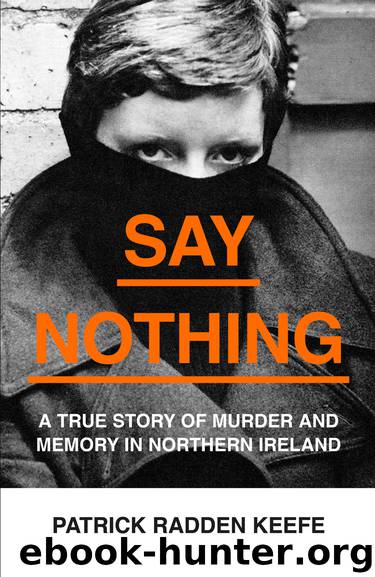Say Nothing by Patrick Radden Keefe

Author:Patrick Radden Keefe
Language: eng
Format: epub
Publisher: HarperCollins Publishers
Published: 2018-09-24T16:00:00+00:00
A month after Molloy’s body was discovered, the commission exhumed two more corpses from a bog in County Monaghan: Brian McKinney, son of Margaret McKinney, who had advocated for the families of the disappeared, along with his friend John McClory. They had been killed for stealing a gun from a Provo arms dump and using it to rob a bar. The search for bodies seemed to be gathering momentum, and one day that summer the children of Jean McConville assembled on a beach at the tip of the Cooley Peninsula, in County Louth. It was a bleak and lonely spot, rocky and raked by the breeze, fifty miles or so from Belfast. Information had surfaced, passed along by the IRA, that their mother had been buried at a spot along this stretch of the coast. Massive excavators lumbered around the site like prehistoric beasts, their craned arms churning up the soil and sand. Police officers in fluorescent jackets worked pneumatic drills, pickaxes, shovels and rakes while the McConville children watched and waited.
This vigil was a reunion for the siblings, but a dissonant one. As children, they had fiercely resisted any effort by the state to split the family up, as though they knew in advance that once they were prised apart, they might never come back together. They had gone their separate ways, getting in touch only sporadically. As they gathered now, in the hope of finally recovering their mother, some of them worried that they would no longer know how to relate to one another as siblings. The physical resemblance among them remained striking. Most of Jean’s children shared her narrow face, sharp cheekbones and small, pursed mouth. But the siblings, who were in their thirties and forties now, looked older than their years; their faces were haggard, and the hands and forearms of the men were etched with inky, blue-black tattoos. They were fractious and edgy around each other. When they spoke of Jean, each tended to use the singular possessive rather than the plural – ‘my mother’ – as if they were all only children.
Jim McConville, who was six when his mother was abducted, had been in and out of prison. Archie, like several of the siblings, had struggled with alcohol, and with his temper. ‘If someone says the wrong thing, you would explode,’ he said. ‘If something is said that hits the right spot, you can’t hold back.’ The children hadn’t had any counselling to speak of, so their grief and anger were still raw and unprocessed. They were particularly incensed at the IRA – over the decision to disappear their mother but also, perhaps even more so, over the suggestion that Jean McConville might have been an informant. The whispers about Jean had started not long after her death, the notion that she might have been executed for being a tout. As if it were not misfortune enough to be orphaned at a young age and cast into austere and predatory Irish orphanages, the children had come of age bearing that incendiary stigma.
Download
This site does not store any files on its server. We only index and link to content provided by other sites. Please contact the content providers to delete copyright contents if any and email us, we'll remove relevant links or contents immediately.
| Anthropology | Archaeology |
| Philosophy | Politics & Government |
| Social Sciences | Sociology |
| Women's Studies |
The Secret History by Donna Tartt(16611)
The Social Justice Warrior Handbook by Lisa De Pasquale(11486)
Thirteen Reasons Why by Jay Asher(7783)
This Is How You Lose Her by Junot Diaz(5754)
Weapons of Math Destruction by Cathy O'Neil(5032)
Zero to One by Peter Thiel(4818)
The Myth of the Strong Leader by Archie Brown(4786)
Promise Me, Dad by Joe Biden(4441)
Stone's Rules by Roger Stone(4413)
Beartown by Fredrik Backman(4406)
How Democracies Die by Steven Levitsky & Daniel Ziblatt(4393)
The Fire Next Time by James Baldwin(4338)
100 Deadly Skills by Clint Emerson(4072)
A Higher Loyalty: Truth, Lies, and Leadership by James Comey(4027)
Rise and Kill First by Ronen Bergman(4009)
The David Icke Guide to the Global Conspiracy (and how to end it) by David Icke(3876)
The Farm by Tom Rob Smith(3870)
Secrecy World by Jake Bernstein(3774)
The Doomsday Machine by Daniel Ellsberg(3726)
